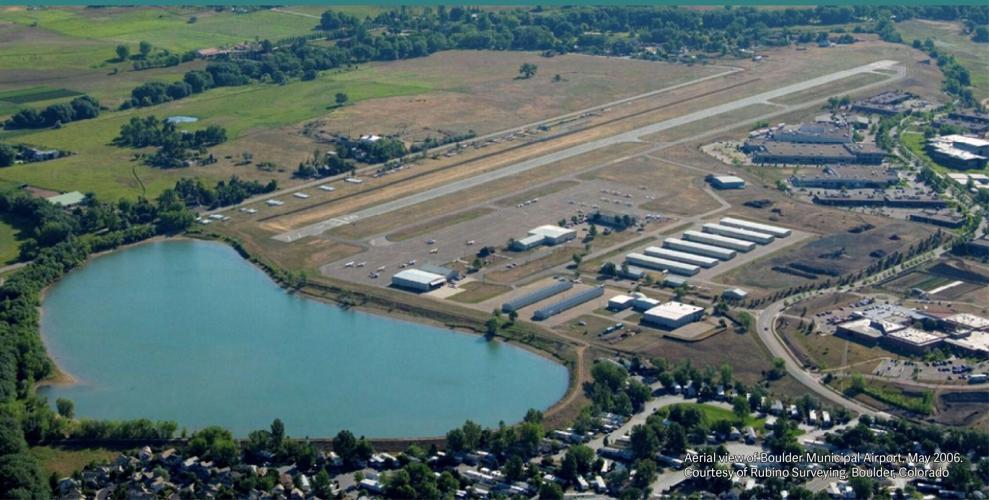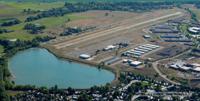Boulder’s small municipal airport is under scrutiny by the city and the community. Options for redevelopment were discussed at an open house Tuesday where 50 or more community members and others gathered to express their opinions about the future of the 94-year-old airport. The attendees were about evenly split between local residents and aviation enthusiasts.
The city launched a public engagement campaign in February to “ensure that community concerns and aspirations are reflected in recommendations for the airport’s future.” The last update was in 2007.
“The city is committed to engaging with the community about the airport throughout the Community Conversation process.” said Interim Transportation and Mobility Director Natalie Stiffler in a news release. “The open houses and upcoming online questionnaires are opportunities for all interested community members to make their voices heard on this topic and contribute to the visioning process. We’re looking forward to positive and productive conversations.”
Four potential options that resulted from a previous open-house were presented for inspection and comment.
Three of the four options preserve the airport and are primarily infill proposals, including a STEM campus and public space improvements. The fourth alternative is the most radical and proposes to close the airport and convert it into middle-income housing and a “walkable” community with services.
“In the city's own survey, only 16% of the people said they wanted to see the airport close,” said Andrew McKenna, one of the owners and the manager of Journeys Aviation, which is the flight school and the fixed-base operator at Boulder Airport in an interview with The Denver Gazette. “So, 84% of the people out there are in favor of keeping the airport open. And yet the anti-airport people seem to get the lion's share of the press. And that's a little frustrating.”
One of the anti-airport people at the meeting was Bryn Grunwald, 28, who works for the Rocky Mountain Institute specializing in bicycling as a climate change solution.
“I am in big favor of closing the airport and building housing,” said Grunwald in an interview with The Denver Gazette. “I am from Boulder, was born and raised here, and there's not many of us left. Most people my age, I'm 28, can't afford to buy a home here...Currently, this is city-owned land. The land could then be made into affordable housing and that would be able to benefit a lot of people.”
Grunwald dismissed the argument that the airport, which has been in operation since 1929, was there first and development has encroached on it knowing it was there.
“Obviously the city has allowed development to creep out towards the airport,” said McKenna. “And frankly, contrary to their grant assurances to the FAA, which stipulate that development in and around the airport must be compatible with airport operations.”
Grunwald thinks housing is more important.
“Times change, and Colorado and Boulder have to change along with them,” said Grunwald. “I understand that it has a big presence here too, but I don't think that discounts all the people who grew up here who will never be able to afford to buy a home here, or the people who work here and can't afford to buy a home, and especially if people are building out businesses here — they should be able to know that their workers actually have a chance of being able to live here.”
But McKenna said Boulder’s housing costs are driven largely by its own open space policies, something created 46 years ago by its first comprehensive plan. Updated seven times since then, Boulder has expanded the moat of open space that surrounds the city that has consequently limited the amount of buildable land available. Even 1,000 square foot homes and condos in town are selling for upwards of $500,000, according to Zillow.
Boulder has more than 45,000 acres of open space surrounding the city that McKenna thinks the city should use for its affordable housing needs, rather than closing the airport. Grunwald acknowledges Boulder’s ownership of undeveloped land abutting developed parts of the city, but insists that the airport should be closed and developed as a new neighborhood.
“That's true, but this could be a good first step to dealing with it. This is already a prime piece of property that's located within the city. The city controls and owns it, so they can mandate that a developer make it mostly affordable housing,” said Grunwald.
“We brought this question up because of the East Boulder plan. They had a plan where they are going to allow up to 4,500 residential units in East Boulder, which has historically been a industrial area, but it's also where the glider box is, where the tows for the glider operations go to gain altitude,” said McKenna. “And none of that has an airport influence zone, nor does it have the requirement for navigation easements. So all of this development is going to be basically contrary to the FAA's grant assurance that says that stuff needs to be compatible with the airport.”
Noise complaints are by far the biggest thorn in the side of airport operations. Despite a detailed voluntary noise-abatement plan created by the city and pilots, Boulder has not implemented an airport overlay zone to control uses near the facility.
McKenna says many of the noise-complaints come from the same people, some of whom make complaints to the city’s complaint website pretty much every day.
“So, there are some people that complain about 30 times a month, and they make up the bulk of the complaints,” said McKenna “They're going to complain once a day, no matter what. I've charted the operations versus the complaints, and it doesn't matter if we have 6,000 operations here, like last summer, or we have 1,800 operations in February. We got the same number of complaints. So the complaints are really not trending with the actual operations of the airport.”
The 179-acre airport is self-sustaining and does not receive subsidies from the city of Boulder General Fund or Transportation Fund according to city officials — but it also generates a great deal of economic benefit.
“The Airport Fund functions as an enterprise entity; although, it is not officially designated as an enterprise fund. Revenue sources include building and land leases, fuel flowage fees, interest income, State of Colorado fuel excise tax, and federal and state airport grants,” according to the city’s airport website, which also says in 2020 the airport generated more than $96 million in direct and indirect economic impacts.
The FAA has invested more than $62 million in the facility, according to McKenna. Any attempt to close it would require the approval of the FAA and would require at least some repayment of that investment.
One of the other hot-button issues in Boulder is the use of leaded aircraft fuel. Leaded aircraft fuel has been long exempted from the general ban on leaded motor fuel because of the special need for lead to help aircraft engines operate at altitude.
“I also don't like that there's lead here. I grew up biking around here and to then be told like, oh yeah, there's lead here and there's no plan to phase it out for the next five years is just unconscionable,” said Grunwald. “There's already existing neighborhoods around that area and I don't think it should be okay to fly an airplane knowing that there's families near here. There's no safe amount of lead that you can have.”
The Environmental Protection Agency has recently taken note of potential health risks of leaded aviation gasoline, but so far has declined to regulate its use.
New non-leaded aviation fuels are under development and some are available now. McKenny would like to see Boulder subsidize the use of lead-free fuel, but it will require infrastructure improvements.
“So, we are working on unleaded fuel, and there is a product out there, it's been approved by the FAA, it's now fleet-wide, it's drop in, you can mix it with Avgas,” said McKenna. “I think within another year or so, we're going to be able to offer fleet wide unleaded here.”
Editor's note: This story has been updated to reflect the fact that Boulder's Airport Community Conversation project is a separate process from the Federal Aviation Administration’s airport master planning.









 Your Privacy Choices
Your Privacy Choices